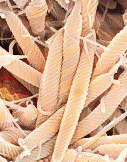Gut Function Initiative

Amanda Ramer-Tait Publications
Document Type
Article
Date of this Version
6-2012
Citation
Acta Biomaterialia (2012) 8: 3,618–3,628
doi: 10.1016/j.actbio.2012.06.001
Abstract
The delivery of antigen-loaded microparticles to dendritic cells (DCs) may benefit from surface optimization of the microparticles themselves, thereby exploiting the material properties and introducing signals that mimic pathogens. Following in vivo administration microparticle surface characteristics are likely to be significantly modified as proteins are quickly adsorbed onto their surface. In this work we describe the chemistry-dependent serum protein adsorption patterns on polyanhydride particles and the implications for their molecular interactions with DCs. The enhanced expression of MHC II and CD40 on DCs after incubation with amphiphilic polyanhydride particles, and the increased secretion of IL-6, TNF-α, and IL-12p40 by hydrophobic polyanhydride particles exemplified the chemistry-dependent activation of DCs by sham-coated particles. The presence of proteins such as complement component 3 and IgG further enhanced the adjuvant properties of these vaccine carriers by inducing DC maturation (i.e. increased cell surface molecule expression and cytokine secretion) in a chemistry-dependent manner. Utilizing DCs derived from complement receptor 3-deficient mice (CR3-/- mice) identified a requirement for CR3 in the internalization of both sham- and serum-coated particles. These studies provide valuable insights into the rational design of targeted vaccine platforms aimed at inducing robust immune responses and improving vaccine efficacy.


Comments
Copyright 2012, Elsevier. Used by permission